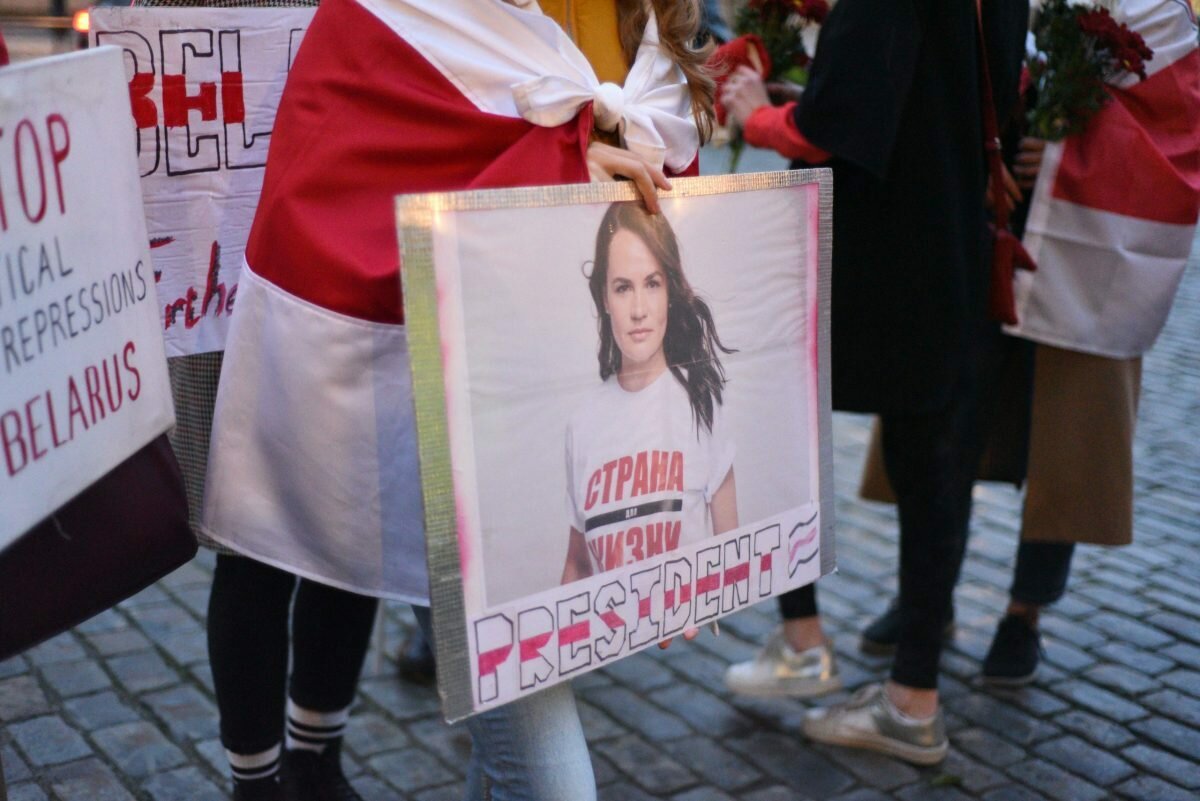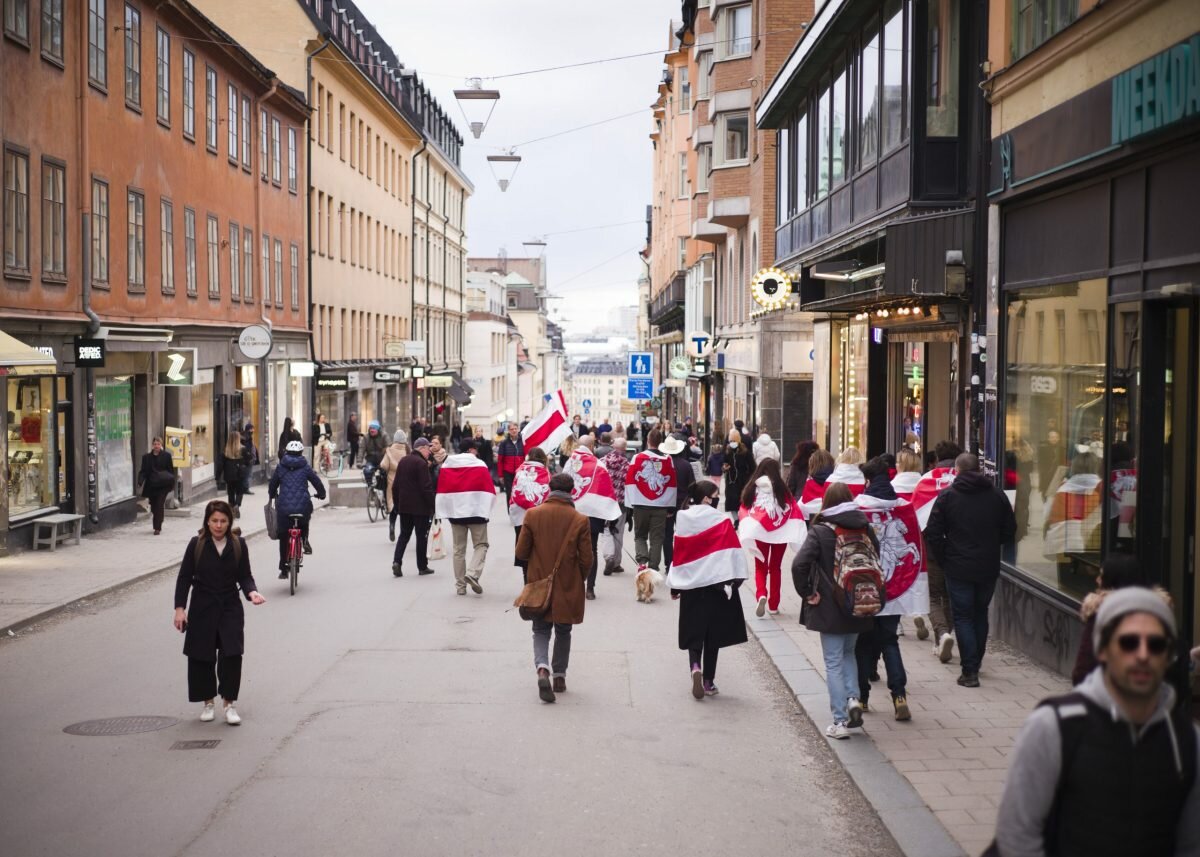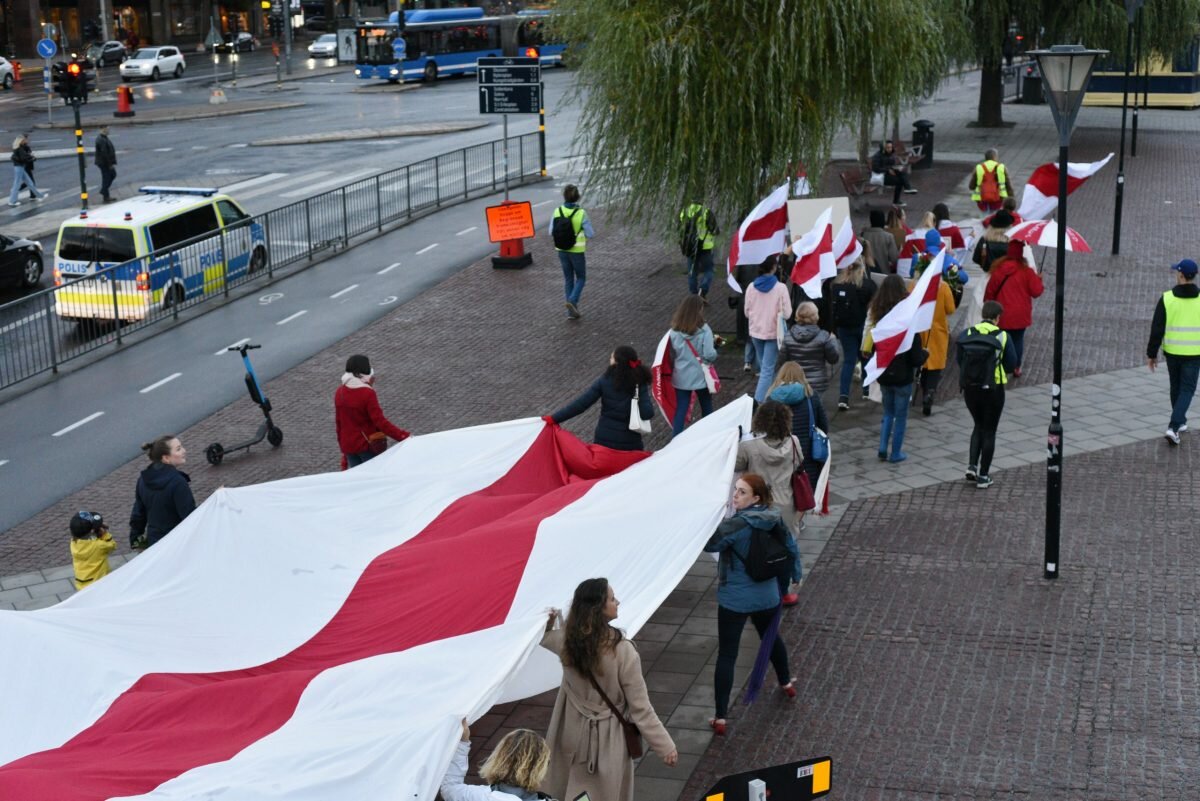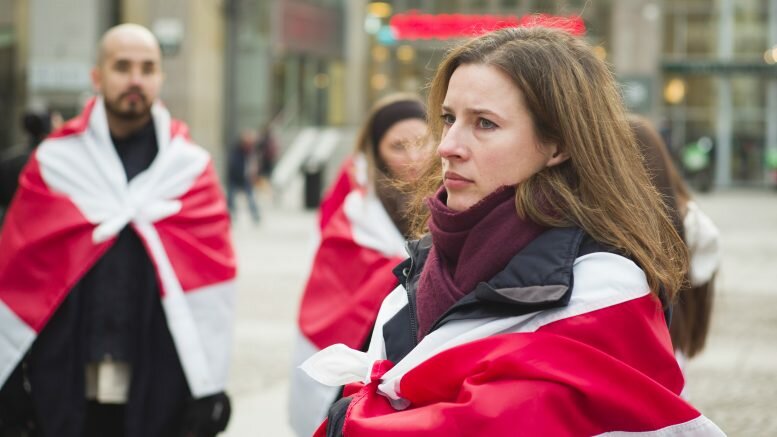We spoke to Norwegian authorities and Belarussian organizations about the situation.
“Reading your Code of Conduct for Business Partners, we see that respect for people, human rights, and appropriate working conditions are your first priorities. Business Integrity and Freedom of Association and Collective Bargaining are also among them.
Belaruskali fails them all.”
This is an excerpt from a letter sent to Norway’s Yara International (an agricultural chemical company owned in part by the Norwegian government) from the Association of Swedish Belarusians in January of 2021. The Association was (and still is) worried about the relationship Yara has with Belaruskali – one of the largest fertilizer producers in the world, and also one of the largest companies owned by the Belarusian government.
Norway Today received information directly from the sources (Norwegian authorities and Belarusian organizations) – including firsthand accounts of protesters and workers in the mines of Belaruskali.
Before we get to that, though, a little background information.
What’s going on in Belarus?
Amid the “chaos caused by the collapse of the Soviet Union in 1991“, Alexander Lukashenko first took office in 1994. Lukashenko, nicknamed “Europe’s Last Dictator” is the longest-serving leader in Europe.
Under its long-term leader, Belarus has forgone privatizations in many industries, maintained a state-loyal mainstream media, continued a covert law enforcement group called the KGB, and held elections that have often not been considered democratic.
2020 Belarus election widely declared illegitimate
After over 20 years, the country reached a breaking point after the election results of August 9, 2020. Lukashenko was proclaimed President of the country, yet again, in a landslide victory considered to be rigged. The US and the EU, among others, refuse to recognize the legitimacy of these elections.
Mass protests, on a scale unprecedented for Belarus, broke out immediately following the revealed results. Citizens cited corruption, poverty, low wages, and a poor coronavirus response by the government as reasons for opposition.
Many also voiced support for Svetlana Tikhanovskaya, who decided to replace her husband Sergey Tikhanovsky as an opposing candidate. Why? Because Sergey Tikhanovsky was arrested by Lukashenko’s government two days after he announced his candidacy – and banned from participating in the election. Svetlana Tikhanovskaya and her supporters (who photographed their ballots for proof anticipating election fraud) believe she received most of the votes. But after she filed a motion against the reported election results, she was forced to move with her children across the border to Lithuania, where they now live in exile.

Nonetheless, Tikhanovskaya and other protesters are still actively trying to engage the international community (she has personally met with leaders such as Angela Merkel and Emmanuel Macron) to stop Lukashenko’s regime.
Opposition can be life-threatening
In the face of all these alleged injustices, protests are still ongoing in Belarus. As we’ve seen, though, opposition to Lukashenko comes with a major cost.
At least 33,000 protesters have been arrested since August of 2020. Many have allegedly been beaten and tortured – and some even murdered – while hundreds face prison sentences (some of which are long-term).
Svetlana Tikhanovskaya is still in exile from her home country. Sergey Tikhanovsky is still being detained in his home country. Other prominent candidates (including former ambassador to the United States Valery Tsepkalo) have also been barred from participating in elections.
Where does Norway come into the picture?
Meanwhile…
Norway’s Yara International (of which 36% is owned by the Ministry of Trade, Industry, and Fisheries) remains “a long-term partner to one of Belarus’s biggest companies” (in their own words), Belaruskali. Belaruskali is owned by (and partially finances) Lukashenko’s government.
The Strike Committee of Belaruskali (founded on August 17, 2020) has raised an outcry against the continued business relationship. The Strike Committee sent a letter directly to Svein Tore Holsether, Yara’s CEO, this year.
In the letter, obtained by Norway Today, the Strike Committee provides a list of allegations arranged by date. These include claims that Belaruskali covered up and falsely represented their inhumane working conditions during Yara’s auditing visit late last year to a mine in Belarus (more on that below, too).
Part of the letter reads:
“We ask you to ask yourself simple questions.
“Do you want to pay for the construction and operation of camps for dissenters, the first in Europe since Hitler and Stalin?
“Do you want to pay for the luxurious lives of people who in black masks and unmarked cars kidnap civilians from the streets?
“Are you prepared to live with the knowledge that you helped murderers and rapists to do their despicable deeds?
“Is the [Yara International] Code of Conduct a smokescreen for profit, squeezed from the tears and blood of the innocent, or the founding document of your company?”

Belarusians directly involved tell their story
We spoke to members of the Association of Swedish Belarusians and the Strike Committee of Belaruskali, as well as Belaruskali employees. These are the firsthand accounts of three people involved.
Please introduce yourself.
OLEG: “My name is Oleg Kudelka. I’m the mining foreman of an underground mining site, with working experience in underground conditions for over 20 years. For more than 13 years, I served as Deputy Head of a mining site, kept mining documentation, and supervised mining operations at the site.”
DMITRI: “My name is Dmitri Vasserman, I’m a board member of the Association of Swedish Belarusians and I also volunteer for the People’s Embassy of Belarus in Sweden.”
VLADIMIR: “My name is Vladimir Vladimirovich Timoshchenko, and I was dismissed from my position at Belaruskali as a mechanic for
instrumentation and automation of the Laboratory of Radioactive Engineering and Safety. I was fired for being absent for 2 days. I explained in written form to the trade union (which is not independent anymore) that I was on strike for those two days and that I have that right to that according to international law. This was ignored and I was fired.”
How long do you think Belaruskali has been infringing on human rights?
OLEG: “Human rights have been violated at Belaruskali ever since the Independent Trade Union of Miners lost its independence and decent leaders of the trade union were replaced with functionaries completely dependent on the employer.”
DMITRI: “The human rights issue is not only about Belaruskali but about the country as a whole. In 2020, after the presidential elections, an unprecedented wave of violence swept across the country. The former president retains power by using unprecedented brutality. Human rights are not just violated, they have basically ceased to exist. This also applies to the attempts of the workers to go on strike in August – all who expressed their opinion were fired and/or imprisoned. The workers have no legal right to go on strike and are faced with a choice: dismissal or to work for the illegitimate government. Also in Belaruskali, safety rules are constantly violated, there are frequent collapses in mines. That is why we can say that workers’ rights and violations of their right to safety have always been a problem, this is not a recent issue.”
VLADIMIR: “At the time of my dismissal, there were only 5 days left until I would have worked at Belaruskali for 10 years. During the entire time I was employed at Belaruskali, I saw constant violations to which the management doesn’t pay attention, and in some cases forces people to commit these violations.”


Please describe the human rights infringements at Belaruskali.
OLEG:
- “The increasing wear-and-tear of the equipment on which the production process takes place forces employees to violate the rules for operating the equipment as well as equipment admission rules;
- old, worn-out tools are used for the repair and maintenance of equipment, and sometimes there is a complete absence of these tools;
- there is increased labor intensity, especially for a downhole group of workers (the workload sometimes reaches more than 43 hours a week which is a violation of the local regulations);
- there is an extremely high level of injuries as a result of increased labor intensity and excessive staff fatigue;
- there is an absence of control on the part of trade unions in the investigation of accidents and incidents; their investigations are biased;
- there is concealment of many incidents and accidents by the administration, and pressure from the leadership on the victims to conceal the facts of incidents;
- the investigations during the years with the current CEO [Ivan Golovaty] have never led to the prosecution of those who were actually guilty;
- there is an extremely low level of competence among the management of the divisions and departments of the production association; and
- there are low levels of special education and promotion to leadership positions.
“All this leads to incompetent technical solutions which in turn leads to fatal accidents.
Belaruskali works us to the point of exhaustion, to the verge of our strength and capabilities. Also, there are practically no repairs done to equipment. All of this is why accidents, including fatal ones, occur with frightening regularity.”
DMITRI:
“Here is the latest data from the Strike Committee:
- More than 120 strikers – FIRED;
- more than 800 days of total arrest of members of the Strike Committee of Belaruskali;
- about 80 victims among the strikers in Soligorsk (including imprisonment, 6 fabricated criminal cases, BEATINGS and TORTURE)
- imprisonment (for example, in the case of Ruslan Okostko it was for 3 years);
- more than USD 15000 in fines paid by workers;
- two strikers with their families were evicted from their homes
- pressure through family members (children, spouses, parents) on the strikers; and
- the strike was declared illegal by the Minsk Regional and Supreme Courts (which is a violation of the [UN’s] Declaration of Human Rights).
“Some jailed workers took the ultimate desperate step: they went on hunger strikes to get heard.”
VLADIMIR: “Workers at Belaruskali are forced under threat of punishment to go to all kinds of elections, to vote, and to attend rallies and holiday cleanings – all which are formally “optional”. Before the arrival of senior management, many workers are forced to stop doing their usual work and sent to clean the territory of mining administrations, paint fences and curbs, mow grass without instruction and basic safety techniques, and so on. Some workers are forced to go to the private houses of their superiors (the management) to perform various types of work (illegally and often for free. Though it depends – sometimes for a free working day or similar).
“Some workers don’t get their short-term contracts renewed without any warning (since 1999, short-term contracts have been a common practice in many of Belarus’ state companies. Under normal conditions they are just renewed and people can keep working like that for years. It is also very easy for the employer to not renew the contract).
“Working conditions in some areas are very difficult. If an urgent task is given, different kinds of workers can be unsafely working at one object. For example, while laying a cable, a hail of sparks can pour down onto one’s head as hot work with a metal cutter is being carried out just above. Industrial waters of different temperatures and contents can also flow.
“So, for me personally, when installing an emitter of ionization radiation, a technical liquid with a temperature of about 80 degrees Celsius was poured onto my back under my clothes. After that, a burn remained on my back. And this is just one particular case.
“Installers are not always given scaffolding to work at heights and they have to climb the cable route at a heights of 5 meters without mounting belts to perform the work.
“Organizations that have been working closely with Belaruskali for a long time, and whose leaders have close contact with the leadership of Belaruskali, can redraw any tool or equipment that is the private property of other companies in order to supply fakes of these products. Some enterprises supply other people’s products, or used ones, under the guise of a new product of their own. After the public announcement of a procurement tender, secret tenders are also made – and only certain suppliers are made aware of them. Other companies who send the proposals in response to the public tender are rejected.”
Below is a photo, sent by another miner who wished to remain anonymous, showing an example of working conditions in the mine. It shows the preparation and installation of “experimental” longwalls at Belaruskali. These longwalls lead to reserves that were previously considered losses when designing the mine. But recently, executives decided to make use of the reserves, after all, to extend the life of the mine, maximize the extraction of minerals, to increase profits. The design calculations for such sections are carried out using ready-made tracing papers – so the conditions of specific areas of mines are not taken into account.
It was in a similar area of Belaruskali’s mine 3 where two miners died while in an “experimental” area on March 9, 2018. Their names were Dmitry Valkov and Maxim Ivanov. Workers say that if the approach to the design of mining sites does not change, one day they may become a “mass grave”.

How involved in all of this is the Belarussian government?
OLEG: “The Open Joint Stock Company “Belaruskali” is wholly owned by the state. All income, more than 75%, goes to the state budget and supports the current regime. The head of the enterprise is a relative of the eldest son of the dictator and acts to the detriment of the collective and openly supports the regime. This is Ivan Golovaty, a member of the upper house of the parliament and a member of the country’s Security Council. He actively suppressed the strike of the workers wishing to defend their civil liberties in August of 2020. The company’s finances were used to pay for the hotel accommodation of the OMON (a special police force) detachment that took part in the arrests and beatings of the strike participants, and for the meals of the OMON in the city cafe. Also, several minibusses were donated to the OMON detachment by Belaruskali.”
DMITRI: “Belaruskali is a state-owned enterprise directly related to Mr. Lukashenko. It is interesting to note that Ivan Golovaty, the CEO of the enterprise, is also the godfather of Lukashenko’s children. Obviously, Lukashenko is directly involved with the enterprise’s daily operations as well. He uses the plant’s profits to fund Dinamo-Minsk, his pet hockey team. Following any corruption schemes related to Belaruskali will eventually lead you to Lukashenka himself.
“This is why Lukashenko is so concerned with the plant’s state of affairs. It is all about the massive amounts of money that he needs so desperately in the middle of a deepening economic and political crisis when sources of money to borrow are running dry. Neither he nor his underlings are concerned with workers’ rights or the environment that they work in. For his regime, the workers are merely a resource, a rightless group of people who make money for him.
“No one is even concerned the least with modernizing the production facilities despite accidents – often lethal – taking place more and more often. The workers’ working environment leaves a lot to be desired, as machinery is often old and rusted and ventilation is barely working. Here’s a more recent example: in one of the mine control facilities, a roof partially collapsed. Thankfully, no one was injured.”


VLADIMIR: “The government has direct influence. The General Director of Belaruskali is a representative of the government. Also, many other ministers of different titles come to the enterprise with so-called inspections.”
What do you know about Yara International’s visit to Belaruskali’s mine in late 2020?
OLEG: “During the negotiations of the Strike Committee with Yara’s CEO, it was proposed that members of the Strike Committee, who know the real state of affairs at Belaruskali, would be included in the audit. This however was not done. The reality has nothing to do with the picture shown to the auditors. Thus, there is no reason to expect any fairness or objectivity from the audit.
“Belaruskali’s management was actively preparing for Yara International’s audit. The routes of movement of the audit commission were thoroughly worked out ahead of time. The administrative buildings were tidied up by third-party cleaning companies. Third-party companies are normally never used due to the special security status of the enterprise. The treatment and tunneling complexes in the mine were stopped for two days and were actively put in order and in a safe condition ahead of the visit. Employees of the team who got in touch with the auditors were prepared for conversations and questions. Those who did not agree to lie were replaced by the management and sent on an extraordinary day off. Representatives of Yara were isolated from the workers as much as possible; they were not allowed to see anything outside the planned route which was brought to a safe state. Moreover, on the day the auditors arrived in the city, a worker was seriously injured in the mine of the 1st mining department, but the management of Belaruskali concealed this incident.”
DMITRI: “We know about the visit of the Norwegians to Belaruskali from the words of the factory workers. When the Norwegians tried to communicate with labor collectives, they were not allowed to do so. They were under constant observation by the plant’s safety service and could not even approach them. The translator who accompanied the delegation is affiliated with the General Director and accompanies him on all business trips; that’s why when the Norwegians tried to communicate with workers, she was an extra layer of filtering. As we know, during their negotiations with Belaruskali, Yara did not even mention the possibility of canceling their contract. The representatives of the Norwegian company simply state once more that workers’ opinions have to be respected no matter what political beliefs they have. This simply has no effect. Additionally, according to our sources, Yara is trying to negotiate a contract more favorable for itself. This is apparently done at the expense of the miners’ rights.”
VLADIMIR: “Yara came to the 4th mine department, from where I was fired. My former colleagues said that the workers were told to prepare for the arrival of the commission. Many violations and emergency areas were urgently fenced off with signs of repair work and pasted over with tape prohibiting entry – and as soon as the commission left, all the signs were removed. During Yara’s visit, the ventilation in the mine was turned on at full capacity, which was noticed by experienced workers immediately when descending into the mine in the cage. The ventilation is usually, when the Yara audit isn’t happening, in fact very bad in the mine, especially in some places. The system is old and needs huge modernization. Normally, it is not working at full capacity as it is very energy-consuming. This way the management saves on electricity. The ventilation is especially bad on weekends when the management is not working.”

What have Belarusians in Belarus been doing to stop the actions of Belaruskali?
OLEG: “On August 17, 2020, the so-called Strike Committee was founded. Since then and until the middle of December the number of participants regularly increased. Thousands of workers believed that their civil rights were violated, and the bravest among them joined the strike. Unfortunately, since January, the financial support previously received by the strikers from solidarity funds stopped and it became more difficult to participate in the strike. Many members of the strike have loan obligations; most have families, small children. Financial difficulties arise.
“In addition, for expressing their civic position through a public protest, many of the strike participants got and are still getting administrative arrests and numerous fines. Some of the participants in the strike under the threat of fabricated criminal cases were forced to urgently leave the country. The total number of days that the strikers spent under arrest is about 800, the total amount of fines reached more than 13,000 dollars.
“During the arrests, the most severe measures of pressure were applied to the strikers, like beatings and persecution with pepper gas. One of the detainees after such a harsh arrest ended up in the hospital and doctors were forbidden to disclose his diagnosis.
“The shamelessness of the authorities reached such a degree that the detained strikers, whose arrest terms were coming to an end, were convicted again. This was only to hide them during the presence of representatives from Yara in Belarus – since the traces of beatings on their bodies left during the arrest by the police officers were not gone in two weeks.
“Some people were detained when leaving their house, the police broke into apartments of others and confiscated phones, computers, tablets… None of this was returned. The Strike Committee and family members are under unprecedented pressure from the security forces and the management of the enterprise. Spouses of strikers are being dismissed from work, strikers are being threatened that their children will be taken away by the guardianship authorities, the strikers are not issued some medical certificates from the health care center. But the participants of the strike believe that justice will prevail and will hold on until they win.”
DMITRI: “Since August 9, protests in Belarus have not stopped. They were harshly suppressed by the security forces and now the protest movement exists locally, in the form of courtyard activities. All protests in Belarus were exclusively peaceful, to which the regime responded with an unprecedented wave of violence, including murders, massive torture, sexual violence, arbitrary arrests, harassment of people at their homes, dismissals, and army drafts as a punishment. More than 33,000 Belarusians have been detained since August and around 300 Belarusians are recognized as political prisoners. Miners continue to join strike committees and express solidarity with one another.”
VLADIMIR: “At the moment, only the Strike Committee is fighting against Belaruskali. Everyone else was intimidated and cajoled with bonuses and more bonuses. From the very first day, all the participants in the strike have been pressured in various forms and methods. We were grabbed and beaten with truncheons, our phones were opened and private correspondence read. The strike participants were imprisoned (15 days is the usual detention period length, though it sometimes can be longer or shorter) and in prison deprived of sleep, shoes, the opportunity to wash, of mattresses… The floor of the isolation wards was covered with bleach and they were also thereby deprived of health, and poisoned in the cells with pepper gas. Loud music praising the current government was played in the cells. This is done by local police, sometimes people in civilian clothes, that normally don’t introduce themselves. All facts show that this is approved by the government. And Belaruskali almost is the government, it’s totally dependent.”
What have Belarussians abroad been doing to stop the actions of Belaruskali?
DMITRI: “We are in contact with the Strike Committee and helping them both with the means of existence, political contact, and lobbying for sanctions with the regime in general and Belaruskali in particular. There are rumors that Lukashenka’s regime has created secret squads to murder “traitors” in other countries, but it’s not possible to confirm. Previously, the KGB plotted to murder oppositionists in other countries and in at least one case succeeded.”
Has Yara International responded to attempts at making contact?
DMITRI: “The representatives of the Belarusian opposition forces as well as diaspora members have contacted Yara. At the end of January 2021, Belarusians from the Swedish diaspora sent emails to Yara’s Ethics and Compliance Department to report the problem, as well as called the same department via telephone. The operator recommended writing an email, but no emails ever got answered. The most recent letter was sent on March 1 by the British diaspora. It remains to be answered. Yara representatives have contacted the Belaruskali Strike Committee, and strike representatives have clearly communicated to them their demand: canceling the contract between Yara and Belaruskali. At the moment, every single dollar Belaruskali receives is used to support the regime. It seems that these contacts are not bringing about any results but we will keep on pushing. We are currently preparing letters for Norwegian MPs and we will be working with them regarding this question.”
What is, in your opinion, the ideal solution now?
OLEG: “The question arises – does Yara’s management really seek the truth about the state of affairs at the enterprise, or is this another way to get a discount on products using caring for people and adhering to their own code as an excuse? Leaders of this rank are not at all naive people, and here you can see the cold calculus of smart businessmen who received free advertising around the world, raised the company’s stock prices to the maximum height, and are only concerned about additional discounts and profits.
“I believe that Yara should, not only in words but also by action prove adherence to democratic principles and comply with the Code of Conduct for Business Partners, which is published on Yara’s website. The Norwegian government can help the management of Yara to commit an undoubtedly difficult, but surely absolutely honest and decent act – breaking the contract with Belaruskali. It should be understood that the leadership of our country is already beginning to feel a shortage of foreign exchange earnings in the country and feels a lack of funds to maintain the level of brutality and repression by law enforcement agencies. After all, the supporters of the dictator and the regime are greedy people looking for profit, people that were promised big money, cheap housing, and other material benefits for their support. But it’s not just about finances. The dictator’s regime fears that the termination of the contract with Yara will serve as a signal to other foreign companies to stop cooperation with the regime.”
“I would also like to add that the workers of Belaruskali will in no way suffer from the termination of their contract with Yara, as the trade unions are trying to make it seem (the trade unions are not independent anymore).”
DMITRI: “We call upon Yara to break off any relationship that it currently has with Belaruskali, including current contractual obligations as well as signings of any additional contracts, until the political crisis in Belarus has been settled and the Strike Committee’s demands fulfilled. This will put further pressure on Lukashenko’s illegitimate regime and will relieve the workers of the pressure of going to work fearing for their lives. The position of the Strike Committee is shared by the Belarusian diaspora, the democratic opposition, as well as all Belarusians who yearn for democratic change.
“Unfortunately, it is obvious at this point that it is impossible to influence the regime for the better by maintaining a working relationship with it. The working conditions are not getting any better as repressions worsen. Not so long ago, in late February, 7 members of the Strike Committee were detained by law enforcement. The detained later told of actual torture at the police station, including being beaten up and pepper spray being sprayed in their faces.
“Yara has already violated its own Code of Conduct and its own principles. Unfortunately, further cooperation with Belaruskali means simply pursuing their own business interests with no consideration given for the workers’ rights.”

Please add anything else you think is important for the public to know.
DMITRI: “All that Belarusians need in their struggle for the protection of human rights and democracy is solidarity. And solidarity, in turn, means not working with companies or people who are responsible for repressions or fund persons or entities responsible for those. Belaruskali hits all the notes in this situation. The only way to fix the human rights situation in this enterprise and, consequently, in the whole country, is to break off any relations with the illegitimate government and those who finance it.”
Belaruskali did not respond to Norway Today’s request for comment.
What do Norwegian authorities have to say?
The human rights accusations against Belaruskali and the government of Belarus, in this case, are shocking and abhorrent. And this is far from the first time they’ve been brought to light in the media and to global authorities. Meanwhile, Norway enjoys a position among the world’s top 10 countries that seem to care most about human rights.
So, it’s surprising that Norwegian authorities – still – haven’t taken further steps in the situation.
Yara International
We reached out to Yara International for comment on March 23. Yara’s Director of External Communications Josiane Kremer responded the next day, saying: “I would like to refer you to Yara’s statement on the situation in Belarus.”
In that PR statement, issued on January 21, 2021, Yara acknowledges human rights abuses in Belarus.
In the same breath, it confirms that it will continue working with Belaruskali – “but will continue to monitor the situation closely…”.
Ministry of Trade, Industry and Fisheries of Norway
We also reached out to Norway’s Ministry of Trade, Industry, and Fisheries, which owns 36.2% of Yara International. It has the largest portion of any main Yara shareholder (by far – the second highest is The Government Pension Fund Norway with 6.2% ownership).
In response to our request for comment sent March 23, the Ministry replied on March 24:
“The state’s exercise of ownership is based on the division of roles and responsibilities between the owner, the board of directors and the general manager set out in company law, and on generally recognized principles and standards for corporate governance. The state has special attention to separating its role as an owner from its other roles. This and other principles followed by the state when exercising its ownership are described in the report “The state’s direct ownership of companies – sustainable value creation.
“The situation being referred to is part of the responsibility of the company board and management. The Norwegian state expects companies in which it has an ownership stake to lead the field in its work on having responsible business conduct including conducting due diligence based on recognized methods, and work to protect human and labor rights in their own business and in the supply chain.”
We will publish answers from any additional institutions when and if we receive them.
Back in November of 2020, Norway decided to join the EU in standing against the Lukashenko government.
“We hope the restrictive measures will put pressure on the Belarusian authorities to respect human rights, enter into dialogue with the opposition, and facilitate democratic development.
“The abuses of power we are witnessing are completely unacceptable,” Foreign Minister Ine Eriksen Søreide (H) said at the time.
The EU countries and Norway, among others, imposed measures such as travel restrictions and the freezing of funds.
Belaruskali still seems to be exempt from the restrictive measures.
At least for now.
Source: #Norway Today, #NorwayTodayNews
Do you have a news tip for Norway Today? We want to hear it. Get in touch at info@norwaytoday.no





Leave a comment